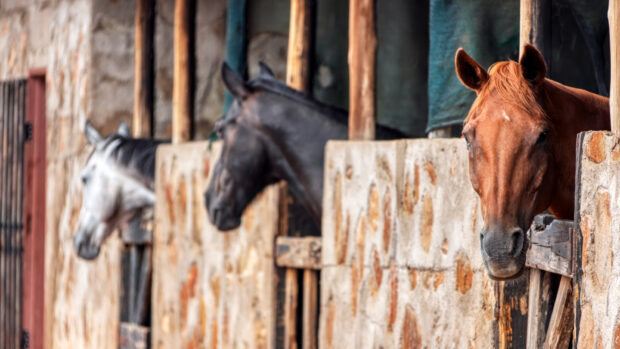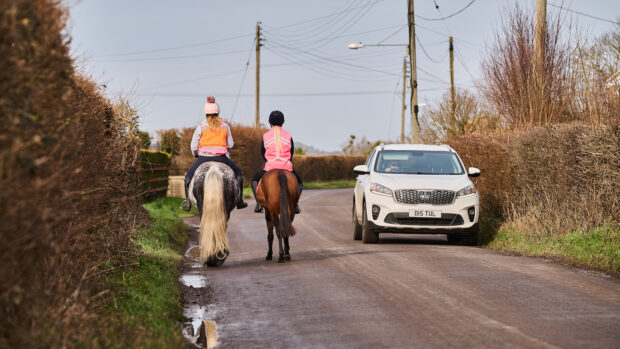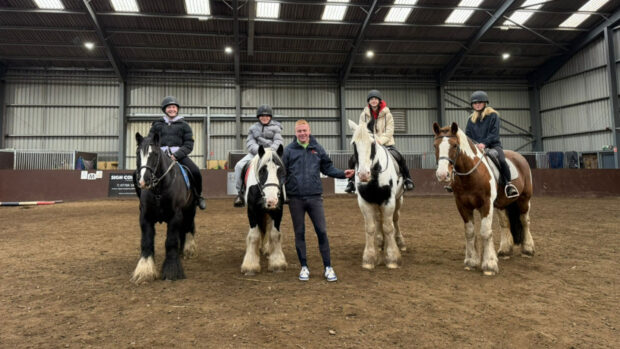Concerns have been raised by horse owners after a mineral exploration company revealed plans to carry out surveys across rural land using a low-flying helicopter with a large suspended sensor.
Privately owned Aberdeen Minerals Limited posted flyers last week to properties across the northeast of Scotland informing owners of the six-week programme. The flyer states that contractor SkyTEM will be flying “low and slow”, and the hexagonal geophysical sensor will be around 35 to 50 metres above the ground. It says the helicopter will be flying at 75 to 90 metres.
The helicopter will not be flying directly over urban dwellings, farm buildings and areas of development. But the company recommends owners of animals or livestock that “may be sensitive” should be “brought under cover”.
A number of horse owners across the region have shared concerns about the plans and the lack of detailed information provided. The flyer states that further information is available online and a QR code can be scanned – but when H&H checked, this information was not available.
Zosia Patterson, who keeps an event horse at a yard in Aberdeenshire, said she is worried her gelding could suffer an injury if he becomes stressed by the helicopter.
“I’m also worried about the risk to riders. No horse is ever bombproof, however good they are. If you stress them with something bizarre that they haven‘t experienced, threatening them at a height like that, they’ll think World War III has come,“ she said. “It’s not just horses, it’s the sheep in the fields around here lambing, and the cattle. They can get injured and be killed if they run into a fence. This is people’s livelihoods.
“I don’t want to obstruct progress, but I want to be asked nicely. My biggest concern is the way the information is worded – the suggestion is that we should keep our horses in for six weeks. Are they going to pay for the shavings costs, or for someone to muck out? Let alone the fact horses could injure themselves if they’ve been kept in and not had any exercise. They haven’t thought about it.”
Cleveland Bay breeder Kate Lines, who also received the flyer, said her biggest concern is her two fillies and other youngstock.
“Cleveland Bays are on the Rare Breeds Survival Trust priority watchlist and we absolutely cannot afford to put pure-bred foals at risk. It would be an absolute tragedy if anything happened to them for the future of the breed,” she said.
“The wording on the flyer is very arrogant, there’s a complete lack of understanding and doesn’t imply there is any consultation – it’s telling us ‘This is happening’. I don’t think housing animals in these situations is the answer. ”
Kate raised concerns with the company via email on Friday (6 May) and received a response which said “Regrettably, the final details of the survey have yet to be finalised between ourselves, our contractions and the Civil Aviation Authority (CAA).” On Saturday (7 May) Kate received another response confirming the survey will not take part over her property.
The flyer states “Our CAA-approved airborne geophysical programme is a first for the northeast and is a safe and proven method for conducting non-invasive mineral exploration”.
“Firstly it is important to note that all required permissions to conduct this specialist low-level survey have been received from the CAA,” Aberdeen Minerals told H&H.
“In order to have secured the necessary flight authorisations from the CAA our contractor is mandated to follow all the requirements laid out in the UK aviation laws and regulations and, as with any commercial aircraft operator in the UK, the contractor holds comprehensive insurances.”
On Friday the CAA told H&H that it had received a request for permission to carry out low-level helicopter flying operations by an approved helicopter operator and it was “reviewing this request ”. On Monday (9 May) the CAA confirmed that permission had been granted.
Addressing the concerns, Aberdeen Minerals general manager Drew Craig said the company takes health and safety “very seriously” and its technical management team have several decades of experience working safely on projects around the world.
“Some enquiries have of course raised concerns related to incidents due to low-flying military aircrafts. The helicopter being used for our survey is a small single-engine aircraft, travelling at around 70 mile per hour, at around 300 feet and has a sound output of around 87 decibels – not comparable at all to much larger military helicopters or fast-moving fighter jets. Our contractor’s pilot has the ability to make course corrections whilst in the air to avoid anything that might be deemed to be at risk on the ground, or a danger to the helicopter,” he said.
“We are working closely with the helicopter contractor and SkyTEM to ensure that best practice is adhered to, and we are working closely with them to advise any concerned landowners or members of the public in advance of flight activity over their lands.”
Mr Craig said the company is in contact with the British Horse Society (BHS).
“Once the flight schedule has been finalised, the details that will be published will enable all land users to see when and where we’ll be flying. If they would like to do so, they can also register with us to have direct notification of when we’d expect any overflights to occur,” he said.
BHS Scotland national manager Helene Mauchlen said since the launch of the BHS incidents website in November 2010 the society has received more than 400 reports of horse accidents involving low-flying aircraft, of which five horses and one rider have died.
“While we value the importance of sourcing clean, zero-carbon supplies, the impact this low-flying helicopter with its suspended sensor could have on horses on the ground is a huge concern,” she said.
“We urge Aberdeen Minerals to work with the BHS to minimise risk by formulating a detailed informative plan that takes horses and their riders into consideration, and gives all horse owners/riders visibility of exactly when to expect the aircraft in their area. As one of the highest populated regions for horses in Scotland, prioritising the horses’ welfare and safety is of utmost importance across Aberdeenshire.”
You might also be interested in:

New safety app allows riders to report incidents ‘quickly and easily’
Riders can report any problems with a road or off-road user, slippery road surfaces, dogs, low-flying aircraft, nuisance drones or

‘She was one of us’: much-loved mare dies after Chinook helicopter flies low overhead
‘She was a family member. She was well respected, and much, much loved’

Subscribe to Horse & Hound magazine today – and enjoy unlimited website access all year round
Horse & Hound magazine, out every Thursday, is packed with all the latest news and reports, as well as interviews, specials, nostalgia, vet and training advice. Find how you can enjoy the magazine delivered to your door every week, plus options to upgrade your subscription to access our online service that brings you breaking news and reports as well as other benefits.




